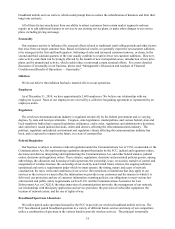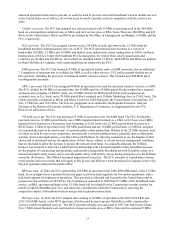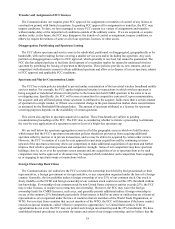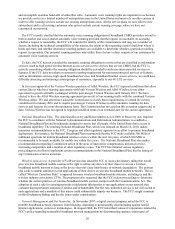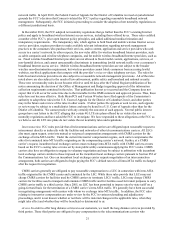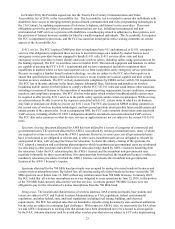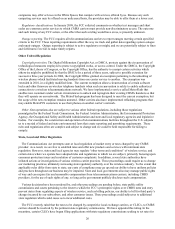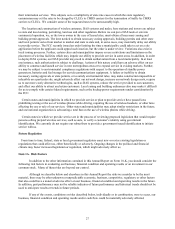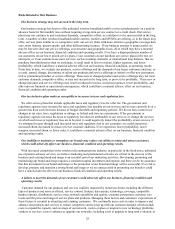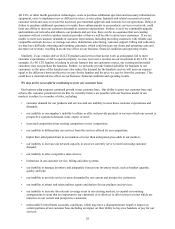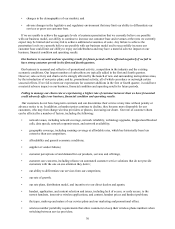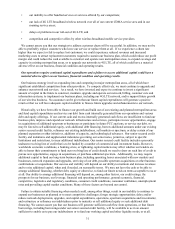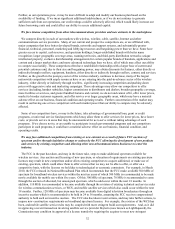Metro PCS 2010 Annual Report Download - page 32
Download and view the complete annual report
Please find page 32 of the 2010 Metro PCS annual report below. You can navigate through the pages in the report by either clicking on the pages listed below, or by using the keyword search tool below to find specific information within the annual report. 22
terminate our subscribers’ long distance calls. Historically, CMRS carriers generally have not been entitled to
receive direct access payments for the long distance calls they terminate, but must pay access charges to other
telecommunications carriers for calls they terminate. In October 2007, the FCC initiated a proceeding to determine
whether the FCC’s current rules ensure that the rates for switched access services charged by LECs are just and
reasonable. In this and related proceedings, the FCC is investigating certain traffic stimulation activities of LECs
which are alleged to generate excessive fees for switched access traffic and which could affect compensation for
intra-MTA traffic delivered by CMRS carriers to LECs. The FCC also is considering whether sharing of access
revenues is appropriate. We and others have asked the FCC to cap the amount of compensation paid to LECs for
traffic that is grossly imbalanced. If the FCC adopts such proposed limitations, it could reduce the amount of
compensation we are obligated to pay LECs, and may affect the amount of access sharing revenue we receive.
Universal Service Fund (USF). The FCC has adopted rules requiring interstate communications carriers,
including CMRS carriers, to “make an equitable and non-discriminatory contribution” to a Universal Service Fund,
or USF, that reimburses communications carriers who are providing subsidized basic communications services to
underserved areas and users. The FCC requires carriers providing both intrastate and interstate services to contribute
to a USF fund based upon their percentage of traffic which is interstate. The FCC permits CMRS carriers to use a
safe-harbor percentage of interstate traffic to calculate their USF contribution and, historically, we have made these
FCC-required payments using the FCC safe-harbor percentage. However, starting in 2010, we stopped using the
FCC safe harbor percentage and began determining our interstate service based on a traffic analysis of our actual
customer’s usage. The FCC has rules that govern the nature and extent of the recovery of USF-related fees and
charges that carriers can recover from customers. The FCC also has rulemaking proceedings pending in which it is
considering a comprehensive reform of the manner in which it assesses carrier USF contributions, how carriers may
recover their costs from customers and how USF funds will be distributed among and between states, carriers and
services. Some of these proposals may cause the amount of USF contributions required from us and our customers
to increase. The Commission has recently opened a Notice of Proposed Rulemaking and Further Notice of Proposed
Rulemaking requesting comments on various proposed changes to the USF.
Eligible telecommunications carriers. Wireless broadband mobile carriers may be designated as Eligible
Telecommunications Carriers, or ETCs, and may receive universal service support for providing service to
customers using wireless service in high cost areas or to certain qualifying low income customers. Certain
competing wireless broadband mobile carriers operating in states where we operate have obtained or applied for
ETC status. Their receipt of universal service support funds may affect our competitive status in a particular market
by allowing our competitors to offer service at a lower rate or for free, subsidized by the USF. The FCC is
considering altering, reducing, or capping the amount of universal support received by CMRS ETC providers. In
May 2008, the FCC adopted an interim cap on payments to ETCs under the USF relating to providing wireless
service in high cost areas, pending comprehensive reform. We may decide in the future to apply for an ETC
designation in certain qualifying high cost areas where we provide wireless services or to provide subsidized service
to certain low income customers, though our ability to qualify may be affected by ongoing changes and possible
future limitations in the program. If we are approved, these payments would be an additional revenue source that we
could use to support the services we provide in high cost areas or to certain low income customers. The FCC also
recently has sought comment on the establishment of a Mobility Fund using universal service funds that were
relinquished by Verizon Wireless and Sprint Nextel totaling between 100 to 300 million dollars. Under the FCC
proposal, this Mobility Fund would be used to support private investment to improve the coverage of current
generation or better mobile voice and Internet service in areas where such coverage currently is missing. The FCC
proposes to make grants from the Mobility Fund using a reverse auction to determine who would receive support.
The FCC has not indicated when it will take action on its proposal.
Services to persons with disabilities. Telecommunications carriers are required to make their services reasonably
accessible to persons with disabilities. These FCC rules generally require service providers to offer equipment and
services accessible to and usable by persons with disabilities, if readily achievable, and to comply with FCC-
mandated complaint/grievance procedures. These rules are largely untested and are subject to interpretation through
the FCC’s complaint process. These rules focus mainly on requirements that must be met by the manufacturers of
wireless equipment, but a certain percentage of our handsets must be hearing aid compatible and we have annual
reporting requirements. In addition, we are required to offer these hearing aid-compatible wireless phones for each
air interface we provide. As a result, this requirement may limit our ability to offer services using new air interfaces
other than CDMA 1xRTT, such as dual mode CDMA/4G LTE handsets, may limit the number of handsets we can
offer, or may increase the costs of handsets for those new air interfaces.




